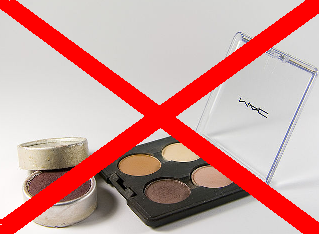Makeup is the new girdle.
I stopped wearing cosmetics a few months ago, after about half a year of using the stuff only sparingly. I started weaning myself off makeup because I had come to hate the hassle of applying it, and because I hated fretting about my appearance. I was also beginning to think of makeup as old-fashioned, an antiquated 'modesty' that inspires shame in one's true appearance. The longer I go without a cosmetic product on my face, the more I believe that makeup needs to go the way of the girdle. The restrictive, uncomfortable, needless, obsolete girdle. How many undergarments are you wearing right now? I'm guessing two at most. Likewise, I only wear two small undergarments below my clothes, even on the most formal occasions. Interview? Presentation? Class? Wedding? A bra and underwear are always adequate. Since I've never had to wear more than two undergarments, I find it staggering that women used to wear massive bras, high-waisted underwear, girdles, pantyhose or stockings, garter belts, slips, and camisoles. I often wear less than that as a full outfit. Anyone who knows me in real life can confirm that I regularly step out in leggings and a t-shirt (plus two small undergarments beneath). I don't say this to titilate, just to illustrate, because I suspect my bare-bones attire is quickly becoming the norm. I've spent a lot of time on college campuses- big and small, public and private, Jesuit and blessedly godless. Everywhere I've seen legions of women and girls decked out in equal or greater states of undress than my own. Gone are the girdles. [More . . . ]

